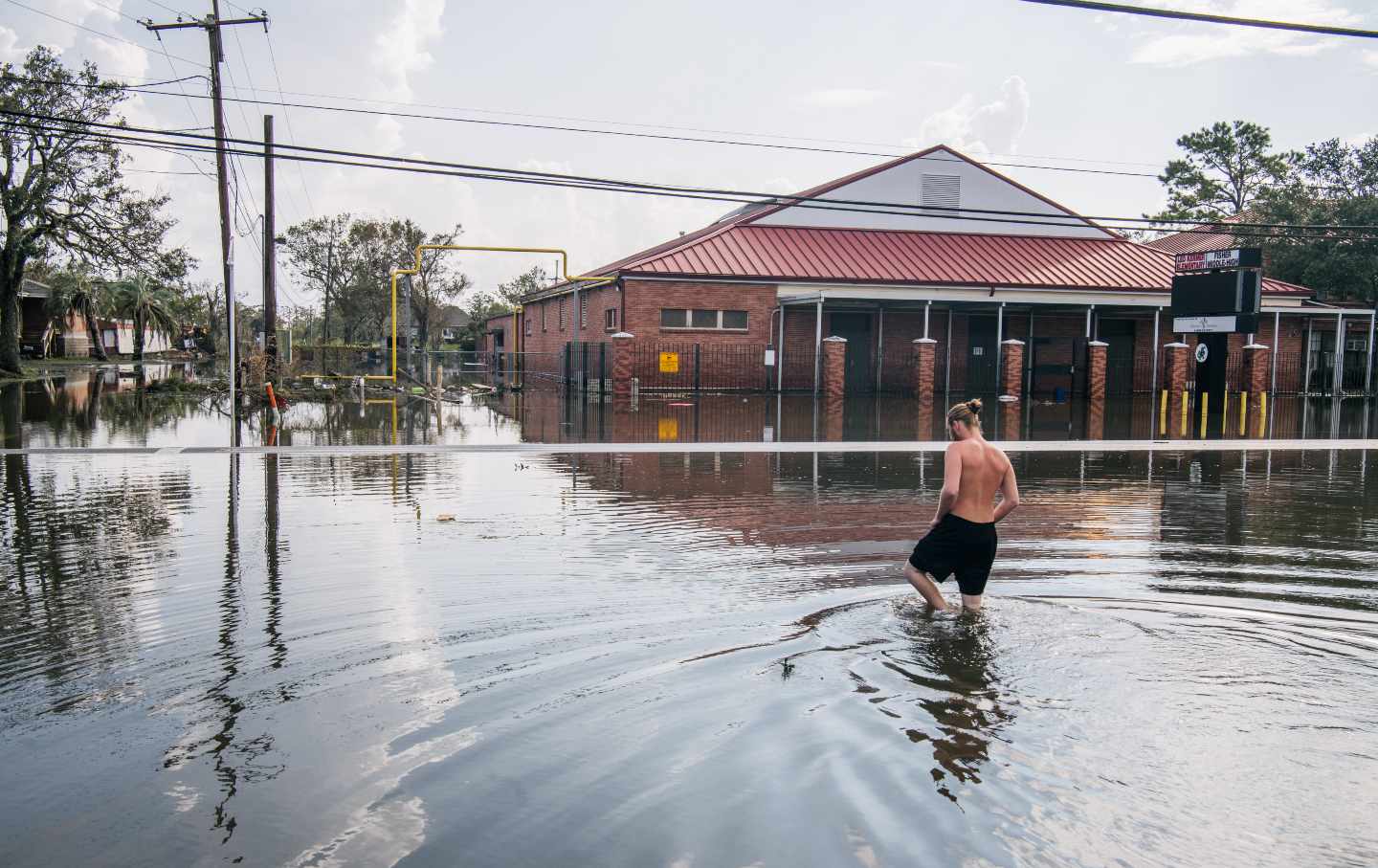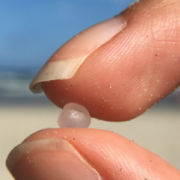- Hubbert
- Mar 25, 2007
-

At a time of universal deceit, telling the truth is a revolutionary act.
|
Life Circa 2050 Will Be Bad. Really Bad.
Future widespread suffering won’t be caused by some unforeseen disaster but by all-too-obvious, painfully predictable reasons.
By Alfred McCoy

A person wades through water while waiting for aid on September 1, 2021, in Jean Lafitte, La. Jean Lafitte Mayor Tim Kerner has pleaded for help for residents of the small town, which is roughly 20 miles south of New Orleans. (Photo by Brandon Bell / Getty Images)
When midnight strikes on New Year’s Day of 2050, there will be little cause for celebration. There will, of course, be the usual toasts with fine wines in the climate-controlled compounds of the wealthy few. But for most of humanity, it’ll just be another day of adversity bordering on misery—a desperate struggle to find food, water, shelter, and safety.
In the previous decades, storm surges will have swept away coastal barriers erected at enormous cost and rising seas will have flooded the downtowns of major cities that once housed more than 100 million people. Relentless waves will pound shorelines around the world, putting villages, towns, and cities at risk.
As several hundred million climate-change refugees in Africa, Latin America, and South Asia fill leaky boats or trudge overland in a desperate search for food and shelter, affluent nations worldwide will be trying to shut their borders even tighter, pushing crowds back with tear gas and gunfire. Yet those reluctant host countries, including the United States, won’t faintly be immune from the pain. Every summer, in fact, ever more powerful hurricanes, propelled by climate change, will pummel the East and Gulf Coasts of this country, possibly even forcing the federal government to abandon Miami and New Orleans to the rising tides. Meanwhile, wildfires, already growing in size in 2021, will devastate vast stretches of the West, destroying thousands upon thousands of homes every summer and fall in an ever-expanding fire season.
And keep in mind that I can write all this now because such future widespread suffering won’t be caused by some unforeseen disaster to come but by an all-too-obvious, painfully predictable imbalance in the basic elements that sustain human life—air, earth, fire, and water. As average world temperatures rise by as much as 2.3° Celsius (4.2° Fahrenheit) by mid-century, climate change will degrade the quality of life in every country on Earth.
-
Climate Change in the 21st Century
This dismal vision of life circa 2050 comes not from some flight of literary fantasy, but from published environmental science. Indeed, we can all see the troubling signs of global warming around us right now—worsening wildfires, ever more severe ocean storms, and increased coastal flooding.
While the world is focused on the fiery spectacle of wildfires destroying swaths of Australia, Brazil, California, and Canada, a far more serious threat is developing, only half-attended to, in the planet’s remote polar regions. Not only are the icecaps melting with frightening speed, already raising sea levels worldwide, but the vast Arctic permafrost is fast receding, releasing enormous stores of lethal greenhouse gases into the atmosphere.
At that frozen frontier far beyond our ken or consciousness, ecological changes, brewing largely invisibly deep beneath the Arctic tundra, will accelerate global warming in ways sure to inflict untold future misery on all of us. More than any other place or problem, the thawing of the Arctic’s frozen earth, which covers vast parts of the roof of the world, will shape humanity’s fate for the rest of this century—destroying cities, devastating nations, and rupturing the current global order.
If, as I’ve suggested in my new book, To Govern the Globe: World Orders and Catastrophic Change, Washington’s world system is likely to fade by 2030, thanks to a mix of domestic decline and international rivalry, Beijing’s hypernationalist hegemony will, at best, have just a couple of decades of dominance before it, too, suffers the calamitous consequences of unchecked global warming. By 2050, as the seas submerge some of its major cities and heat begins to ravage its agricultural heartland, China will have no choice but to abandon whatever sort of global system it might have constructed. And so, as we peer dimly into the potentially catastrophic decades beyond 2050, the international community will have good reason to forge a new kind of world order unlike any that has come before.
The Impact of Global Warming at Mid-Century
In assessing the likely course of climate change by 2050, one question is paramount: How quickly will we feel its impact?
For decades, scientists thought that climate change would arrive at what science writer Eugene Linden called a “stately pace.” In 1975, the US National Academies of Sciences still felt that it would “take centuries for the climate to change in a meaningful way.” As late as 1990, the UN’s Intergovernmental Panel on Climate Change (IPCC) concluded that the Arctic permafrost, which stores both staggering amounts of carbon dioxide (CO2) and methane, an even more dangerous greenhouse gas, was not yet melting and that the Antarctic ice sheets remained stable. In 1993, however, scientists began studying ice cores extracted from Greenland’s ice cap and found that there had been 25 “rapid climate change events” in the last glacial period thousands of years ago, showing that the “climate could change massively within a decade or two.”
Driven by a growing scientific consensus about the dangers facing humanity, representatives of 196 states met in 2015 in Paris, where they agreed to commit themselves to a 45 percent reduction in greenhouse gas emissions by 2030 and achieve net carbon neutrality by 2050 to limit global warming to 1.5°C above preindustrial levels. This, they argued, would be sufficient to avoid the disastrous impacts sure to come at 2.0°C degrees or higher.
However, the bright hopes of that Paris conference faded quickly. Within three years, the scientific community realized that the cascading effects of global warming reaching 1.5°C above preindustrial levels would be evident not in the distant future of 2100, but perhaps by 2040, impacting most adults alive today.
The medium-term effects of climate change will only be amplified by the uneven way the planet is warming, with a far heavier impact in the Arctic. According to a Washington Post analysis, by 2018 the world already had “hot spots” that had recorded an average rise of 2.0°C above the preindustrial norm. As the sun strikes tropical latitudes, huge columns of warm air rise and then are pushed toward the poles by greenhouse gases trapped in the atmosphere, until they drop down to earth at higher latitudes, creating spots with faster-rising temperatures in the Middle East, Western Europe, and, above all, the Arctic.
In a 2018 IPCC “doomsday report,” its scientists warned that even at just 1.5°C, temperature increases would be unevenly distributed globally and could possibly reach a devastating 4.5°C in the Arctic’s high altitudes, with profound consequences for the entire planet.
-
Climate-Change Cataclysm
Recent scientific research has found that, by 2050, the key drivers of major climate change will be feedback loops at both ends of the temperature spectrum. At the hotter end, in Africa, Australia, and the Amazon, warmer temperatures will spark ever more devastating forest fires, reducing tree cover, and releasing vast amounts of carbon into the atmosphere. This, in turn (as is already happening), will fuel yet more fires and so create a monstrous self-reinforcing feedback loop that could decimate the great tropical rainforests of this planet.
The even more serious and uncontrollable driver, however, will be in the planet’s polar regions. There, an Arctic feedback loop is already gaining a self-sustaining momentum that could soon move beyond humanity’s capacity to control it. By mid-century (or before), as ice sheets continue to melt disastrously in Greenland and Antarctica, rising oceans will make extreme sea-level events, like once-in-a-century storm surges and flooding, annual occurrences in many areas. If global warming grows beyond the maximum 2°C target set by the Paris Agreement, depending on what happens to Antarctica’s ice sheets, ocean levels could increase by a staggering 43 inches as this century ends.
In fact, a “worst-case scenario” by the National Academies of Sciences projects a sea-level rise of as much as 20 inches by 2050 and 78 inches in 2100, with a “catastrophic” loss of 690,000 square miles of land, an expanse four times the size of California, displacing about 2.5 percent of the world’s population and inundating major cities like New York. Adding to such concerns, a recent study in Nature predicted that, by 2060, rain rather than snow could dominate parts of the Arctic, further accelerating ice loss and raising sea levels significantly. Moving that doomsday ever closer, recent satellite imagery reveals that the ice shelf holding back Antarctica’s massive Thwaites Glacier could “shatter within three to five years,” quickly breaking that Florida-sized frozen mass into hundreds of icebergs and eventually resulting “in several feet of sea level rise” on its own.
Think of it this way: In the Arctic, ice is drama, but permafrost is death. The spectacle of melting polar ice sheets cascading into ocean waters is dramatic indeed. True mass death, however, lies in the murky, mysterious permafrost. That sloppy stew of decayed matter and frozen water from ice ages past covers 730,000 square miles of the Northern Hemisphere, can reach 2,300 feet below ground, and holds enough potentially releasable carbon and methane to melt the poles and inundate densely populated coastal plains worldwide. In turn, such emissions would only raise Arctic temperatures further, melt more permafrost (and ice), and so on, year after year after year. We’re talking, in other words, about a potentially devastating feedback loop that could increase greenhouse gases in the atmosphere beyond the planet’s capacity to compensate.
According to a 2019 report in Nature, the vast zone of frozen earth that covers about a quarter of the Northern Hemisphere is a sprawling storehouse for about 1.6 trillion metric tons of carbon—twice the amount already in the atmosphere. Current models “assume that permafrost thaws gradually from the surface downwards,” slowly releasing methane and carbon dioxide into the atmosphere. But frozen soil also “physically holds the landscape together” and so its thawing can rip the surface open erratically, exposing ever-larger areas to the sun.
Around the Arctic Circle, there is already dramatic physical evidence of rapid change. Amid the vast permafrost that covers nearly two-thirds of Russia, one small Siberian town had temperatures that reached a historic 100 degrees Fahrenheit in June 2020, the highest ever recorded above the Arctic Circle. Meanwhile, several peninsulas on the Arctic Sea have experienced methane eruptions that have produced craters up to 100 feet deep. Since rapid thawing releases more methane than gradual melting does and methane has 25 times more heating power than CO2, the “impacts of thawing permafrost on Earth’s climate,” suggests that 2019 report in Nature, “could be twice that expected from current models.”
To add a dangerous wild card to such an already staggering panorama of potential destruction, about 700,000 square miles of Siberia also contain a form of methane-rich permafrost called yedoma, which forms a layer of ice 30 to 260 feet deep. As rising temperatures melt that icy permafrost, expanding lakes (which now cover 30 percentf of Siberia) will serve as even greater conduits for the release of such methane, which will bubble up from their melting bottoms to escape into the atmosphere.
-
New World Order?
Given the clear failure of the current world system to cope with climate change, the international community will, by mid-century, need to find new forms of collaboration to contain the damage. After all, the countries at the recent UN climate summit at Glasgow couldn’t even agree to “phase out” coal, the dirtiest of all fossil fuels. Instead, in their final “outcome document,” they opted for the phrase “phase down”—capitulating to China, which has no plans to even start reducing its coal combustion until 2025, and India, which recently postponed its goal of achieving net-carbon neutrality until an almost unimaginably distant 2070. Since those two countries account for 37 percent of all greenhouse gases now being released into the atmosphere, their procrastination courts climate disaster for humanity.
Who knows what new forms of global governance and cooperation will come into being in the years ahead, but simply to focus on an old one, here’s a possibility: To exercise effective sovereignty over the global commons, perhaps a genuinely reinforced United Nations could reform itself in major ways, including making the Security Council an elective body with no permanent members and ending the great-power prerogative of unilateral vetoes. Such a reformed and potentially more powerful organization could then agree to cede sovereignty over a few narrow yet critical areas of governance to protect the most fundamental of all human rights: survival.
Just as the Security Council can (at least theoretically) now punish a nation that crosses international borders with armed force, so a future UN could sanction in potentially meaningful ways a state that continued to release greenhouse gases into the atmosphere or refused to receive climate-change refugees. To save that human tide, estimated at between 200 million and 1.2 billion people by mid-century, some UN high commissioner would need the authority to enforce the mandatory resettlement of at least some of them. Moreover, the current voluntary transfer of climate reconstruction funds from the prosperous temperate zone to the poor tropics would need to become mandatory as well.
No one can predict with any certainty whether reforms like these and the power to change national behavior that would come with them will arrive in time to cap emissions and slow climate change, or too late (if at all) to do anything but manage a series of increasingly uncontrollable feedback loops. Yet without such change, the current world order will almost certainly collapse into catastrophic global disorder with dire consequences for all of us.
our children will want to murder us lmfao
|





:format(webp)/cdn.vox-cdn.com/uploads/chorus_image/image/69835578/1235138610.0.jpg)
















































